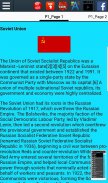








History of the Soviet Union

คำอธิบายของHistory of the Soviet Union
The Union of Soviet Socialist Republics[b] (USSR),[c] commonly known as the Soviet Union,[d] was a socialist state in Eurasia that existed from 30 December 1922 to 26 December 1991.[9] Nominally a union of multiple national Soviet republics,[e] its government and economy were highly centralized. The country was a one-party state, governed by the Communist Party with Moscow as its capital in its largest republic, the Russian Soviet Federative Socialist Republic (Russian SFSR). Other major urban centres were Leningrad, Kiev, Minsk, Alma-Ata, and Novosibirsk.
Extending across the entirety of Northern Asia and much of Eastern Europe, the Soviet Union had spanned eleven time zones and incorporated a wide range of environments and landforms. From northwest to southeast, the Soviet Union shared land borders with Norway, Finland, Poland, Czechoslovakia, Hungary, Romania, Turkey, Iran, Afghanistan, China, Mongolia, and North Korea. It shared its maritime borders with Japan by the Sea of Okhotsk and the US state of Alaska across the Bering Strait. With an area of 22,402,200 square kilometres (8,649,500 sq mi), the Soviet Union was the largest country in the world by area, covering more than one-eighth of the Earth's inhabited land area,[10][11][12] and the third most populous, with over 288 million people as of 1989, with 80% of the population living in the western, European part of the country.
The Soviet Union had its roots in the October Revolution of 1917, when the Bolsheviks led by Vladimir Lenin overthrew the Russian Provisional Government which had replaced Tsar Nicholas II during World War I. In 1922, the Soviet Union was formed by the Treaty on the Creation of the USSR which legalized the unification of the Russian, Transcaucasian, Ukrainian and Byelorussian republics that had occurred from 1918. Following Lenin's death in 1924 and a brief power struggle, Joseph Stalin came to power in the mid-1920s. Stalin committed the state's ideology to Marxism–Leninism (which he created) and constructed a command economy which led to a period of rapid industrialization and collectivization. During this period of totalitarian rule, political paranoia fermented and the late-1930s Great Purge removed Stalin's opponents within and outside of the party via arbitrary arrests and persecutions of many people, resulting in over 600,000 deaths.[13] Suppression of political critics and forced labor were carried out by Stalin's government. In 1933, a major famine that became known as the Holodomor in Soviet Ukraine struck multiple Soviet grain-growing regions, causing the deaths of some 3 to 7 million people.[14]
In August 1939, days before the start of World War II, the Soviets signed the Molotov–Ribbentrop Pact agreeing to non-aggression with Germany, after which the two countries invaded Poland in September 1939. In June 1941, the pact collapsed as Germany turned to attack the Soviet Union, opening the largest and bloodiest theatre of war in history. Soviet war casualties accounted for the highest proportion of the conflict in the effort of acquiring the upper hand over Axis forces at intense battles such as Stalingrad and Kursk. The territories overtaken by the Red Army became satellite states of the Soviet Union and the postwar division of Europe into capitalist and communist halves would lead to increased tensions with the West, led by the United States of America.
สหภาพโซเวียตโซเวียตสาธารณรัฐ [b] (USSR), [c] เป็นที่รู้จักกันทั่วไปว่าเป็นสหภาพโซเวียต [d] เป็นรัฐสังคมนิยมในยูเรเซียที่มีอยู่ตั้งแต่วันที่ 30 ธันวาคม พ.ศ. 2465 ถึง 26 ธันวาคม พ.ศ. 2534 [9] สหภาพแรงงานของสหภาพโซเวียตแห่งชาติหลายแห่งได้รับการตั้งชื่อว่า [e] รัฐบาลและเศรษฐกิจของประเทศต่างๆ ประเทศนี้เป็นรัฐหนึ่งฝ่ายควบคุมโดยพรรคคอมมิวนิสต์ที่มีมอสโกเป็นเมืองหลวงของสาธารณรัฐที่ใหญ่ที่สุดสาธารณรัฐโซเวียตสหพันธ์สาธารณรัฐโซเวียตรัสเซีย (รัสเซีย SFSR) ศูนย์กลางเมืองสำคัญอื่น ๆ ได้แก่ Leningrad, Kiev, Minsk, Alma-Ata และ Novosibirsk
สหภาพโซเวียตได้ขยายเขตเวลาทั้งหมด 11 เขตและรวมถึงสภาพแวดล้อมและภูมิประเทศที่กว้างไกลออกไปทั่วทั้งทวีปเอเซียและสหภาพยุโรปตะวันออก สหภาพโซเวียตมีพรมแดนติดกับนอร์เวย์ฟินแลนด์โปแลนด์เช็กสโลวาเกียฮังการีโรมาเนียตุรกีอิหร่านอัฟกานิสถานจีนมองโกเลียและเกาหลีเหนือ มีพรมแดนติดกับทะเลญี่ปุ่นโดยทะเล Okhotsk และรัฐอะแลสกาของสหรัฐฯผ่านช่องแคบแบริ่ง สหภาพโซเวียตเป็นประเทศที่ใหญ่ที่สุดในโลกโดยพื้นที่ครอบคลุมมากกว่าหนึ่งในแปดของพื้นที่ที่อาศัยอยู่ของโลก [10] [11] [12] และ สามมีประชากรมากที่สุดมีมากกว่า 288 ล้านคนในปี 1989 มี 80% ของประชากรที่อาศัยอยู่ในตะวันตกส่วนยุโรปของประเทศ
สหภาพโซเวียตมีรากฐานในการปฏิวัติเดือนตุลาคมปี ค.ศ. 1917 เมื่อพรรคบอลเช็กนำโดยวลาดิเมียร์เลนินล่มรัฐบาลรัสเซียเฉพาะกาลซึ่งได้เข้ามาแทนที่จักรพรรดินิโคลัสที่สองในช่วงสงครามโลกครั้งที่หนึ่งในปีพ. ศ. 2465 สหภาพโซเวียตก่อตั้งขึ้นโดยสนธิสัญญาเกี่ยวกับการสร้าง ของสหภาพโซเวียตที่ legalized การรวมกันของรัสเซีย Transcaucasian, ยูเครนและสาธารณรัฐ Byelorussian ที่เกิดขึ้นจาก 1,918. หลังจาก Lenin 's ตายใน 1,924 และต่อสู้สั้นอำนาจโจเซฟสตาลินมามีอำนาจในช่วงกลางทศวรรษ 1920s. (ซึ่งเขาสร้างขึ้น) และสร้างระบบเศรษฐกิจที่มีคำสั่งซึ่งนำไปสู่ยุคอุตสาหกรรมและการรวมตัวกันแบบเร่งรัด ในช่วงระยะเวลาของกฎเผด็จการความหวาดระแวงทางการเมืองหมักและสาย 1930s ล้างมากลบฝ่ายตรงข้ามของสตาลินภายในและภายนอกของพรรคผ่านการจับกุมโดยพลการและการข่มเหงของคนจำนวนมากส่งผลให้เสียชีวิตมากกว่า 600,000 [13] การปราบปรามของนักวิจารณ์การเมืองและการบังคับใช้แรงงานได้ดำเนินการโดยรัฐบาลของสตาลิน 2476 ในความอดอยากที่กลายเป็นที่รู้จักในฐานะ Holodomor โซเวียตยูเครนในหลายภูมิภาคโซเวียต - เมล็ดทำให้เกิดการเสียชีวิตของ 3 ถึง 7 ล้านคน [14]
ในเดือนสิงหาคม ค.ศ. 1939 เมื่อวันก่อนเริ่มสงครามโลกครั้งที่สองสหภาพโซเวียตได้ลงนามในอนุสัญญาโมโลตอฟ - ริบเบนตที่ไม่เห็นด้วยกับการรุกรานของเยอรมนีหลังจากที่ทั้งสองประเทศรุกรานโปแลนด์ในเดือนกันยายน 2482 ในเดือนมิถุนายน พ.ศ. 2484 อนุสัญญาฯ ได้ยุบลงเมื่อเยอรมนีหันมา การโจมตีสหภาพโซเวียตเปิดโรงละครสงครามที่ใหญ่ที่สุดและเลือดที่สุดในประวัติศาสตร์ การเสียชีวิตของสงครามโซเวียตเป็นสัดส่วนที่สูงที่สุดของความขัดแย้งในความพยายามของการแสวงหาอำนาจเหนือกว่ากองกำลังของแกนในการสู้รบที่รุนแรงเช่นสตาลินกราดและเคิร์สต์ ดินแดนที่กองทัพแดงกลายเป็นรัฐของสหภาพโซเวียตและกองหลังสงครามโลกครั้งที่สองของยุโรปเข้าสู่ทุนนิยมและคอมมิวนิสต์จะส่งผลให้ความตึงเครียดที่เกิดขึ้นกับตะวันตกเพิ่มขึ้นนำโดยสหรัฐอเมริกา

























